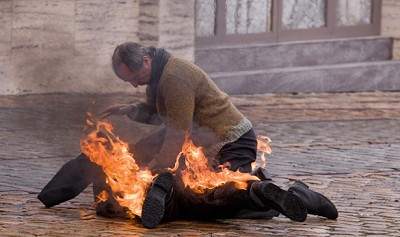The Congress (Ari Folman)
Ari Folman’s The Congress is many things… brilliant, stunning, pick your positive adjective, it will fit. It’s also, I think, fairly prescient, capturing a post-film future where all entertainment has been reduced to sensory manipulation. But at its heart, The Congress is about us… the choices we make every day that affect our lives, our futures, our chances at happiness. Focused on Robin Wright, playing herself in a career-best performance, all of our fears and hesitations are shown through hers. The Congress takes a fairly brutal look at Wright, and the path her career has taken, and asks her (and thus us) if she would give up the struggle to define herself in exchange for eternal comfort.
What follows must be seen to be believed: a trip into the future, with Folman’s trademark animation skills creating a world of pure sensory stimulus, where people are whoever they want to be and no one, at the same time. What emerges is dystopian, horrific in its beauty, and ultimately unforgettable.
A Touch of Sin (Jia Zhangke)
Jia Zhangke’s A Touch of Sin is an unsettling film. It moves through several short stories, each centered on a violent or corrupt act in China, and the whole of it creates a sense of a civilization on the brink. Each story has a person who fights back against a culture of obedience to corrupt bosses, in a sense, but the individual acts never lend a sense of optimism or hope to the film. Their place is harder to judge. Isolated acts that will go ignored? Is it the start of something big? All I was left with was a palpable sense of dread, the powerful idea that China is a cultural bomb waiting to go off. Wonderful stuff.
Burning Bush (Agnieszka Holland)
And finally, Agnieszka Holland’s epic 3-part miniseries for HBO Europe, Burning Bush. This is a devastating film. The true story of Jan Palach, a student who torched himself in a public square to protest Soviet interference in Czechoslovakia in the 1960s, Burning Bush covers the fallout on multiple levels: Jan’s shocked family, the student groups trying to lead the country into a strike to support Jan’s wishes, the Czech police trying to discover who the next torch will be, and ultimately the Soviets who pull the strings from the shadows.
Holland shows a much stronger hand here than in her previous film In Darkness, which was often lost in its own production. Each character is well defined and many are shades of grey; let’s just say the Soviets could be persuasive. Despite appearing in only one scene, the character of Jan is always hovering above the film, his presence felt in the actions and performances of the actors, all solid. My one problem was with the second section, where the film centers on a libel case brought against an official who suggested a conspiracy behind Jan’s death. Though the scenes are all well done, it is clear from the start that the entire courtroom sequence would come down to whether the judge would do the right thing or bow to outside pressure, and the judge is the least fleshed-out character in the film. You end up watching a lot of scenes you guess will become secondary.
Still, that’s only one flaw in an otherwise strong film, one that ably captures a sense of time and place, and is a wonderful tribute to a student’s desperate act. Holland in particular deserves praise for this.
